 W
WPublius Aelius Hadrianus Afer was a distinct and wealthy Roman Senator and soldier who lived in the Roman Empire during the 1st century. Hadrianus Afer was originally from Hispania; however, he was of Roman descent. He was born and raised in the grand city of Italica in the Roman Province of Hispania Baetica. He came from a well-established, wealthy and aristocratic family of Praetorian rank. He was the son of the noble Roman woman called Ulpia and his father was a Roman Senator called Publius Aelius Hadrianus Marullinus. Hadrianus Afer’s maternal uncle was the Roman General and Senator Marcus Ulpius Traianus, the father of Ulpia Marciana and her younger brother Emperor Trajan. Ulpia Marciana and Trajan were his maternal cousins.
 W
WBonosus was a late 3rd-century Roman usurper. He was born in Hispania to a British father and Gallic mother. His father—a rhetorician and "teacher of letters"—died when Bonosus was still young but the boy's mother gave him a decent education. He had a distinguished military career with an excellent service record. He rose successively through the ranks and tribuneships but, while he was stationed in charge of the Rhenish fleet c. 280, the Germans managed to set it on fire. Fearful of the consequences, he proclaimed himself Roman emperor at Colonia Agrippina (Cologne) jointly with Proculus. After a protracted struggle, he was defeated by Marcus Aurelius Probus and hanged himself rather than face capture.
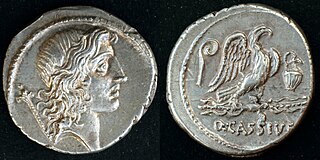 W
WQuintus Cassius Longinus, the brother or cousin of Cassius, was a governor in Hispania for Caesar.
 W
WLucius Junius Moderatus Columella was a prominent writer on agriculture in the Roman empire.
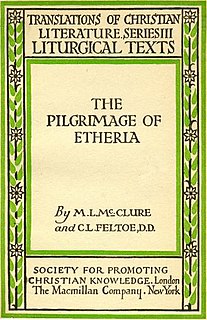 W
WEgeria, Etheria or Aetheria was a woman, widely regarded to be the author of a detailed account of a pilgrimage to the Holy Land about 381/2–386. The long letter, dubbed Peregrinatio or Itinerarium Egeriae, is addressed to a circle of women at home. Historical details it contains set the journey in the early 380s, making it the earliest of its kind. It survives in fragmentary form in a later copy—lacking a title, date and attribution.
 W
WEulalia of Mérida was a young Roman Christian martyred in Augusta Emerita, the capital of Lusitania, during the Persecution of Christians under Diocletian. Other views place her death at the time of Trajan Decius. There is debate whether Saint Eulalia of Barcelona, whose story is similar, is the same person. Up till the proclamation of James, son of Zebedee, Eulalia was invoked as the protector of Christian troops in the Reconquista and was patron of the territories of Spain during their formation.
 W
WAelia Flavia Flaccilla, was a Roman empress and first wife of the Roman Emperor Theodosius I. She was of Hispanian Roman descent. During her marriage to Theodosius, she gave birth to two sons – future Emperors Arcadius and Honorius – and a daughter, Aelia Pulcheria. She was titled Augusta, as her coinage shows.
 W
WHadrian was a Roman emperor from 117 to 138. He was born into a Roman Italo-Hispanic family that settled in Spain from the Italian city of Atri in Picenum. His father was of senatorial rank and was a first cousin of Emperor Trajan. He married Trajan's grand-niece Vibia Sabina early in his career, before Trajan became emperor and possibly at the behest of Trajan's wife Pompeia Plotina. Plotina and Trajan's close friend and adviser Lucius Licinius Sura were well disposed towards Hadrian.
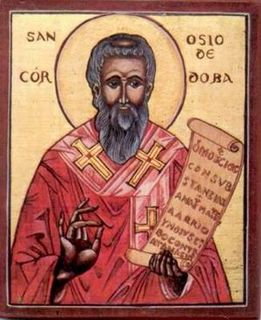 W
WHosius of Corduba, also known as Osius or Ossius, was a bishop of Corduba and an important and prominent advocate for Homoousion Christianity in the Arian controversy that divided the early Christianity.
 W
WLucius Junius Gallio Annaeanus or Gallio was a Roman senator and brother of the famous writer Seneca. He is best known for his impartial judgment of a legal case involving Paul the Apostle in Corinth.
 W
WMarcus Annaeus Lucanus, better known in English as Lucan, was a Roman poet, born in Corduba, in Hispania Baetica. He is regarded as one of the outstanding figures of the Imperial Latin period, known in particular for his epic Pharsalia. His youth and speed of composition set him apart from other poets.
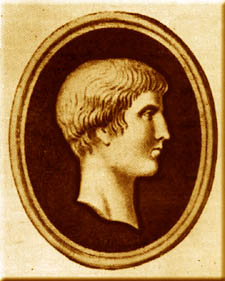 W
WMarcus Valerius Martialis was a Roman poet from Hispania best known for his twelve books of Epigrams, published in Rome between AD 86 and 103, during the reigns of the emperors Domitian, Nerva and Trajan. In these short, witty poems he cheerfully satirises city life and the scandalous activities of his acquaintances, and romanticises his provincial upbringing. He wrote a total of 1,561 epigrams, of which 1,235 are in elegiac couplets.
 W
WPaulus Orosius, less often Paul Orosius in English, was a Roman priest, historian and theologian, and a student of Augustine of Hippo. It is possible that he was born in Bracara Augusta, then capital of the Roman province of Gallaecia, which would have been the capital of the Kingdom of the Suebi by his death. Although there are some questions regarding his biography, such as his exact date of birth, it is known that he was a person of some prestige from a cultural point of view, as he had contact with the greatest figures of his time such as Augustine of Hippo and Jerome of Stridon. In order to meet with them Orosius travelled to cities on the southern coast of the Mediterranean Sea, such as Hippo Regius, Alexandria, and Jerusalem.
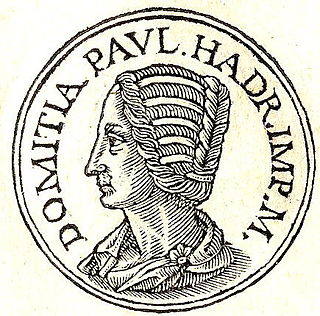 W
WPaulina or Paullina was a name shared by three relatives of the Roman Emperor Hadrian: his mother, his elder sister and his niece.
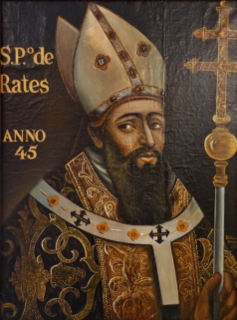 W
WSaint Peter of Rates, also known in English as Saint Peter of Braga, is traditionally considered to be the first bishop of Braga between the years AD 45 and 60. Tradition says he has been ordered to preach the Christian faith by Saint James the Great, and that Peter of Rates was martyred while attempting to make converts to the Christian faith in northern Portugal. The ancient Breviary of Braga and the Breviary of Evora hold that Peter of Rates was a disciple of Saint James and preached at Braga. However, the Bollandists argue that this claim is "purely traditional."
 W
WPomponius Mela, who wrote around AD 43, was the earliest Roman geographer. He was born in Tingentera and died c. AD 45.
 W
WMarcus Fabius Quintilianus was a Roman educator and rhetorician from Hispania, widely referred to in medieval schools of rhetoric and in Renaissance writing. In English translation, he is usually referred to as Quintilian, although the alternate spellings of Quintillian and Quinctilian are occasionally seen, the latter in older texts.
 W
WLucius Annaeus Seneca, also known as Seneca the Younger, was a Hispano-Roman Stoic philosopher, statesman, dramatist, and—in one work—satirist from the Silver Age of Latin literature.
 W
WSerena was a Christian noblewoman of the late Western Roman Empire.
 W
WTheodosius I, also called Theodosius the Great, was Roman emperor from 379 to 395, during Late Antiquity. His reign accelerated the Christianization of the Roman Empire, achieved military successes when the frontiers of the empire were threatened by the wars of the Migration Period, and defeated two rival emperors in successive civil wars. He was the first emperor of the Theodosian dynasty, and married into the ruling Valentinianic dynasty. His decrees made Nicene Christianity the state church of the Roman Empire and punished Roman paganism, Hellenistic religion, and Arianism. At his capital Constantinople he commissioned the honorific Column of Theodosius, the Theodosian Walls, and the Golden Gate, among the greatest works of ancient Roman architecture.
 W
WTrajan was Roman emperor from 98 to 117. Officially declared by the Senate optimus princeps, Trajan is remembered as a successful soldier-emperor who presided over the greatest military expansion in Roman history, leading the empire to attain its maximum territorial extent by the time of his death. He is also known for his philanthropic rule, overseeing extensive public building programs and implementing social welfare policies, which earned him his enduring reputation as the second of the Five Good Emperors who presided over an era of peace and prosperity in the Mediterranean world.
 W
WUlpia was a noble Spanish Roman woman from the gens Ulpia during the 1st century CE.
 W
WThe gens Ulpia was a Roman family that rose to prominence during the first century AD. The gens is best known from the emperor Marcus Ulpius Trajanus, who reigned from AD 98 to 117. The Thirtieth Legion took its name, Ulpia, in his honor.. The city of Serdica, modern day Sofia, was renamed as Ulpia Serdica.
 W
WMarcus Ulpius Trajanus was a Roman senator from the gens Ulpia who lived in the first century. He was father to the Roman Emperor Trajan.